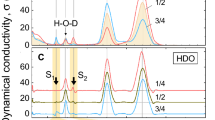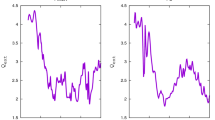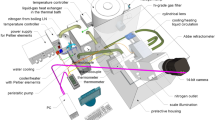Abstract
WATER, the most abundant molecular constituent of the body, is the necessary polar solvent in which physiological and biochemical units associated with cellular biology occur. It forms hydrogen bonds with cellular components which contain polar structural groups such as the protein collagen1 found in the cornea. Direct evidence for molecular perturbations that occur during change in water content in intact tissue has been lacking, although changes are believed to occur. The present work is concerned with the demonstration and interpretation of the changes that occur in the infra-red spectra of the ox cornea during dehydration and during attempts at rehydration.
This is a preview of subscription content, access via your institution
Access options
Subscribe to this journal
Receive 51 print issues and online access
$199.00 per year
only $3.90 per issue
Buy this article
- Purchase on Springer Link
- Instant access to full article PDF
Prices may be subject to local taxes which are calculated during checkout
Similar content being viewed by others
References
Fraser, R. D. B., and Macrae, T. P., Nature, 183, 179 (1959).
Author information
Authors and Affiliations
Rights and permissions
About this article
Cite this article
BAKERMAN, S., MITCHELL, C. Infra-red Examination of the Association of Cornea Proteins with Water. Nature 187, 1033–1034 (1960). https://doi.org/10.1038/1871033a0
Issue Date:
DOI: https://doi.org/10.1038/1871033a0
Comments
By submitting a comment you agree to abide by our Terms and Community Guidelines. If you find something abusive or that does not comply with our terms or guidelines please flag it as inappropriate.



